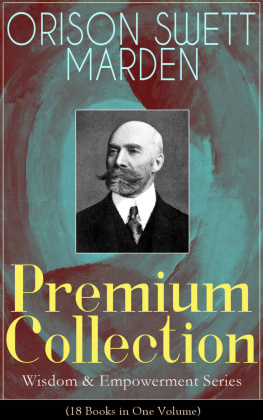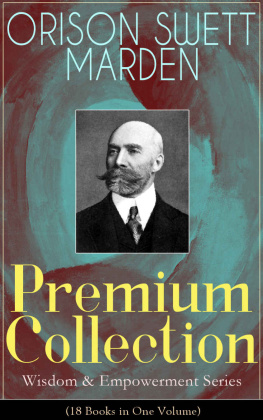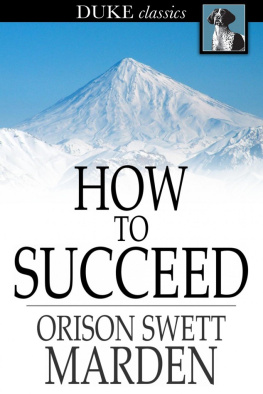Orison Swett Marden
ORISON SWETT MARDEN Premium Collection - Wisdom & Empowerment Series
(18 Books in One Volume)
e-artnow, 2015
Contact:
ISBN 978-80-268-4517-1
Editorial note: This eBook follows the original text.
Table of Contents
An Iron Will
CHAPTER I.
TRAINING THE WILL.
"The education of the will is the object of our existence," says Emerson.
Nor is this putting it too strongly, if we take into account the human will in its relations to the divine. This accords with the saying of J. Stuart Mill, that "a character is a completely fashioned will."
In respect to mere mundane relations, the development and discipline of one's will-power is of supreme moment in relation to success in life. No man can ever estimate the power of will. It is a part of the divine nature, all of a piece with the power of creation. We speak of God's fiat "Fiat lux, Let light be." Man has his fiat. The achievements of history have been the choices, the determinations, the creations, of the human will. It was the will, quiet or pugnacious, gentle or grim, of men like Wilberforce and Garrison, Goodyear and Cyrus Field, Bismarck and Grant, that made them indomitable. They simply would do what they planned. Such men can no more be stopped than the sun can be, or the tide. Most men fail, not through lack of education or agreeable personal qualities, but from lack of dogged determination, from lack of dauntless will.
"It is impossible," says Sharman, "to look into the conditions under which the battle of life is being fought, without perceiving how much really depends upon the extent to which the will-power is cultivated, strengthened, and made operative in right directions." Young people need to go into training for it. We live in an age of athletic meets. Those who are determined to have athletic will-power must take for it the kind of exercise they need.
This is well illustrated by a report I have seen of the long race from Marathon in the recent Olympian games, which was won by the young Greek peasant, Sotirios Lous.
A STRUGGLE IN THE RACE OF LIFE.
There had been no great parade about the training of this champion runner. From his work at the plough he quietly betook himself to the task of making Greece victorious before the assembled strangers from every land. He was known to be a good runner, and without fuss or bustle he entered himself as a competitor. But it was not his speed alone, out-distancing every rival, that made the young Greek stand out from among his fellows that day. When he left his cottage home at Amarusi, his father said to him, "Sotiri, you must only return a victor!" The light of a firm resolve shone in the young man's eye. The old father was sure that his boy would win, and so he made his way to the station, there to wait till Sotiri should come in ahead of all the rest. No one knew the old man and his three daughters as they elbowed their way through the crowd. When at last the excitement of the assembled multitude told that the critical moment had arrived, that the racers were nearing the goal, the old father looked up through eyes that were a little dim as he realized that truly Sotiri was leading the way. He was "returning a victor." How the crowd surged about the young peasant when the race was fairly won! Wild with excitement, they knew not how to shower upon him sufficient praise. Ladies overwhelmed him with flowers and rings; some even gave him their watches, and one American lady bestowed upon him her jewelled smelling-bottle. The princes embraced him, and the king himself saluted him in military fashion. But the young Sotirios was seeking for other praise than theirs. Past the ranks of royalty and fair maidenhood, past the outstretched hands of his own countrymen, past the applauding crowd of foreigners, his gaze wandered till it fell upon an old man trembling with eagerness, who resolutely pushed his way through the excited, satisfied throng. Then the young face lighted, and as old Lous advanced to the innermost circle with arms outstretched to embrace his boy, the young victor said, simply: "You see, father, I have obeyed."
MENTAL DISCIPLINE.
The athlete trains for his race; and the mind must be put into training if one will win life's race.
"It is," says Professor Mathews, "only by continued, strenuous efforts, repeated again and again, day after day, week after week, and month after month, that the ability can be acquired to fasten the mind to one subject, however abstract or knotty, to the exclusion of everything else. The process of obtaining this self-mastery--this complete command of one's mental powers--is a gradual one, its length varying with the mental constitution of each person; but its acquisition is worth infinitely more than the utmost labor it ever costs."
"Perhaps the most valuable result of all education," it was said by Professor Huxley, "is the ability to make yourself do the thing you have to do when it ought to be done, whether you like it or not; it is the first lesson which ought to be learned, and, however early a man's training begins, it is probably the last lesson which he learns thoroughly."
DOING THINGS ONCE.
When Henry Ward Beecher was asked how it was that he could accomplish so much more than other men, he replied:
"I don't do more, but less, than other people. They do all their work three times over: once in anticipation, once in actuality, once in rumination. I do mine in actuality alone, doing it once instead of three times."
This was by the intelligent exercise of Mr. Beecher's will-power in concentrating his mind upon what he was doing at a given moment, and then turning to something else. Any one who has observed business men closely, has noticed this characteristic. One of the secrets of a successful life is to be able to hold all of our energies upon one point, to focus all of the scattered rays of the mind upon one place or thing.
CENTRALIZING FORCE.
The mental reservoir of most people is like a leaky dam which we sometimes see in the country, where the greater part of the water flows out without going over the wheel and doing the work of the mill. The habit of mind-wandering, of worrying about this and that,
"Genius, that power which dazzles mortal eyes,
Is oft but Perseverance in disguise."
Many a man would have been a success had he connected his fragmentary efforts. Spasmodic, disconnected attempts, without concentration, uncontrolled by any fixed idea, will never bring success. It is continuity of purpose alone that achieves results.
LEARNING TO SWIM.
The way to learn to run is to run, the way to learn to swim is to swim. The way to learn to develop will-power is by the actual exercise of will-power in the business of life. "The man that exercises his will," says an English essayist, "makes it a stronger and more effective force in proportion to the extent to which such exercise is intelligently and perseveringly maintained." The forth-putting of will-power is a means of strengthening will-power. The will becomes strong by exercise. To stick to a thing till you are master, is a test of intellectual discipline and power.
DR. CUYLER.
"It is astonishing," says Dr. Theodore Cuyler, "how many men lack this power of 'holding on' until they reach the goal. They can make a sudden dash, but they lack grit. They are easily discouraged. They get on as long as everything goes smoothly, but when there is friction they lose heart. They depend on stronger personalities for their spirit and strength. They lack independence or originality. They only dare to do what others do. They do not step boldly from the crowd and act fearlessly."











